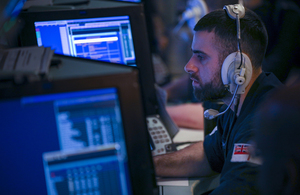
UK: Artificial Intelligence used at sea for first time
For the first time, Artificial Intelligence (A.I.) is being used by the Royal Navy at sea as part of Exercise Formidable Shield, which is currently taking place off the coast of Scotland.
This Operational Experiment (OpEx) on the Type 45 Destroyer (HMS Dragon) and Type 23 Frigate (HMS Lancaster), is using the A.I. applications, Startle and Sycoiea, which were tested against a supersonic missile threat.
As part of the Above Water Systems programme, led by Defence Science and Technology Laboratory (Dstl) scientists, the A.I. improves the early detection of lethal threat, accelerates engagement timelines and provide Royal Navy Commanders with a rapid hazard assessment to select the optimum weapon or measure to counter and destroy the target.
Scottish Secretary Alister Jack said:
It’s vital that our brave and highly skilled Armed Forces stay ahead of the game for the security of the United Kingdom and our allies.
The Royal Navy’s use of A.I. for the first time at sea is an important development in ensuring readiness to tackle threats we may face. I’m proud to see that two Scottish built Royal Navy vessels are at the heart of this exercise in the waters off the Hebrides.
Dstl has worked closely with industry partners Roke (Startle App), CGI (Sycoiea App) and BAE Systems to ensure the new A.I. based applications work alongside existing radar and combat management systems.
The Startle A.I. system is designed to help ease the load on sailors monitoring the ‘Air Picture’ in the Operations Room, providing live recommendations and alerts.
The Sycoiea system builds upon this with Threat Evaluation and Weapon assignment identifying the nearest threat and how best to deal with it.
Dstl’s Programme Manager, Alasdair Gilchrist MBE said:
Dstl has invested heavily in the systems that are installed at the moment, but it’s imperative that we continue to invest to make sure that the Royal Navy remains relevant now and in the future.
Being able to bring A.I. onto the ships is a massive achievement, and while we can prove the A.I. works in the labs, actually getting Navy personnel hands on is brilliant.
As outlined in the recent Defence Command Paper, the MOD is committed to investing in A.I. and increased automation to transform capabilities as the Armed Forces adapt to meet future threats.
HMS Lancaster and HMS Dragon are currently trialling the use of A.I. as part of a glimpse into the future of air defence at sea.
HMS Lancaster’s Weapon Engineer Officer, Lieutenant Commander Adam Leveridge said:
Observing Startle and Sycoiea augment the human warfighter in real time against a live supersonic missile threat was truly impressive – a glimpse into our highly-autonomous future.
Exercise Formidable Shield is Europe’s biggest and most complex air and missile exercise. Designed to improve allied interoperability and capabilities, it is a three-week exercise that carries out live-fire Integrated Air & Missile Defence activity with more than 15 ships, 10 aircraft and around 3,300 military personnel from around the world taking part.
Using NATO command and control reporting structures, ten nations are taking part in the Exercise including Belgium, Denmark, France, Germany, Italy, the Netherlands, Norway, Spain, the United Kingdom, and the United States.
Held every two years, Formidable Shield will run until 3 June and is led by Naval Striking and Support Forces NATO on behalf of the US Sixth Fleet.
